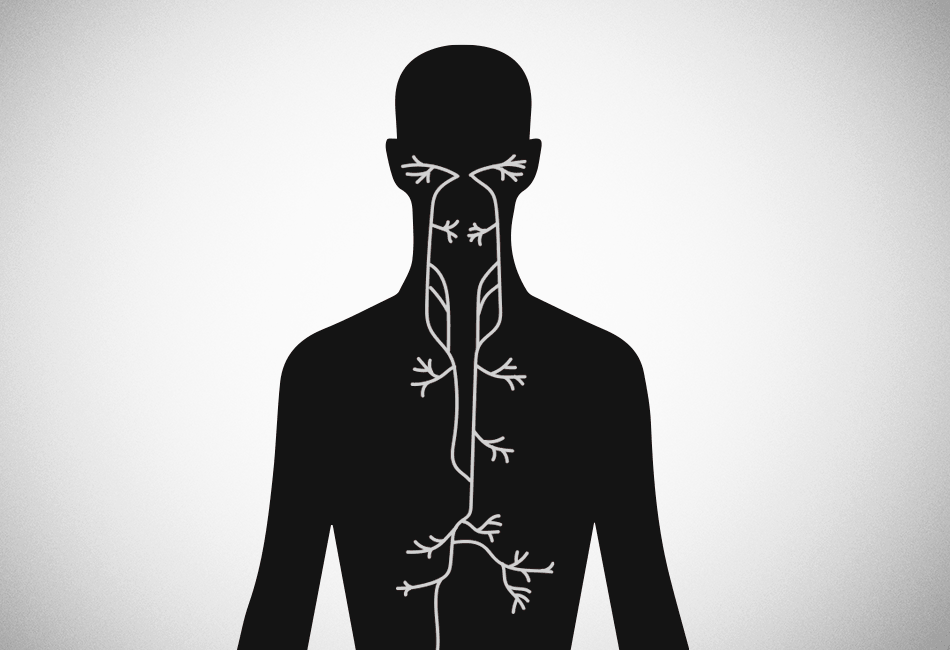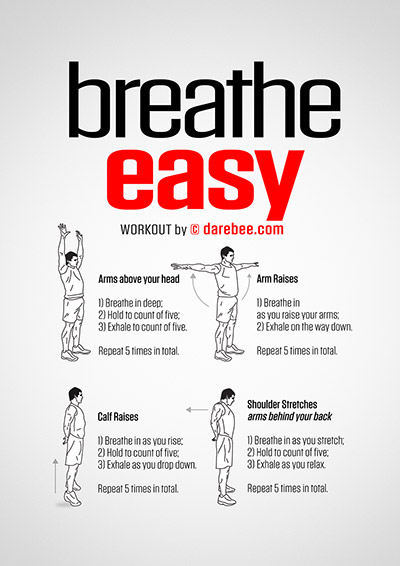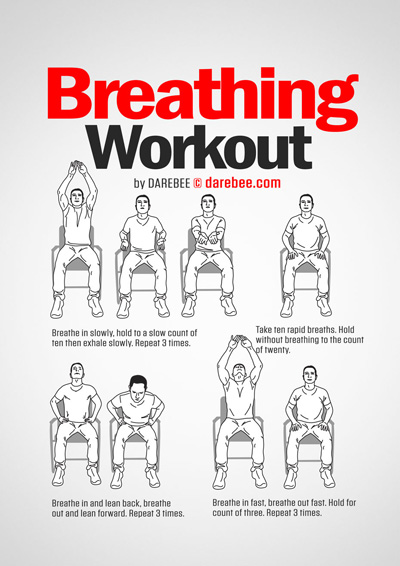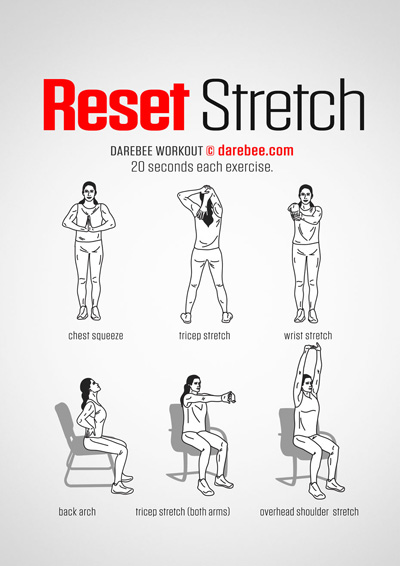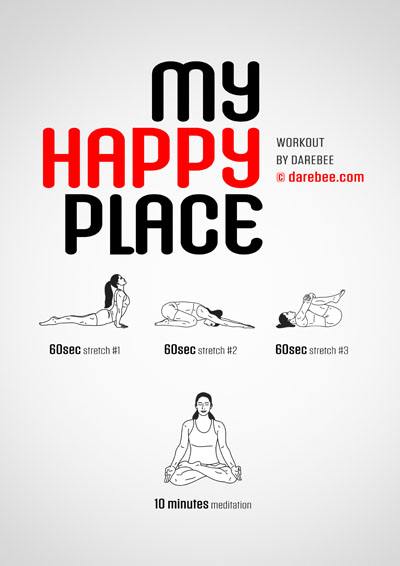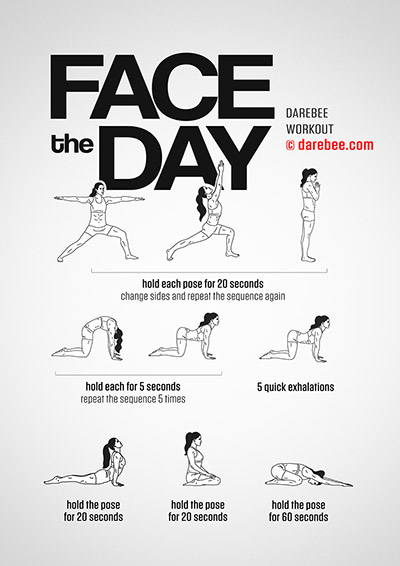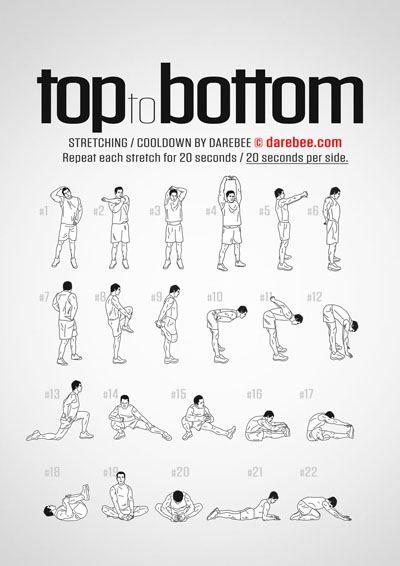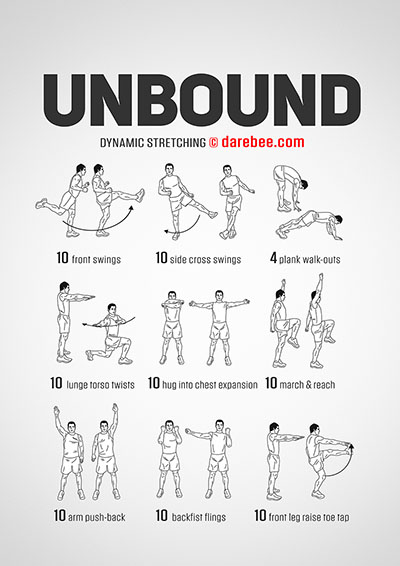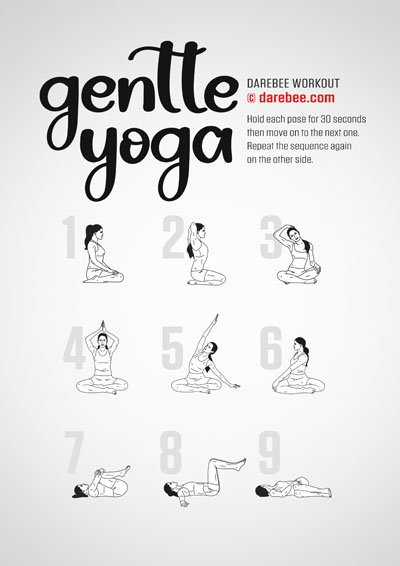If you’ve ever been punched in the stomach, as a kid, and ended up on the floor gasping for breath then you have an immediate grasp of what the vagus nerve is. We don’t use our stomach to breathe with but lying fairly close to the skin at approximately the point between the stomach and the sternum run two parallel lines of nerves that extend deep into the gut and link the brain with the gut, heart, lungs, kidneys and liver. This messaging superhighway, in turn, affects digestion, heartrate, breathing and a host of other complex functions that control how we feel and think[1] and the moment it is disturbed, as by an external blow, we immediately feel its effects.
The point of this example however is that there are external interventions we can apply which directly affect things we don’t think we can affect like blood pressure, heart rate and mood, for instance. What applies for brute force with adverse effects can also be true when the external interventions we apply are gentler in nature and more kindly-intentioned in desired outcome.
But first, some basics.
What Is The Vagus Nerve?
First discovered in the 1800s[2] as a means to combat seizures, the vagus nerve is the longest[3] of twelve cranial nerves[4]. It is made up of thousands of fibers twisted into two bundles that run either side of the neck and descend down into the body branching outwards to link up all our internal organs.
This arrangement makes it the major pathway through which the brain and the other internal organs of the body talk to each other. The vagus nerve is also the main nerve of the parasympathetic nervous system. The parasympathetic nervous system[5] regulates “rest and digest” functions of the body and helps us quieten down and acts as the opposite of the sympathetic nervous system that is involved in active “fight or flight” responses.
The autonomic nervous system is a component of the peripheral nervous system that “regulates involuntary physiologic processes including heart rate, blood pressure, respiration, digestion, and sexual arousal. It contains three anatomically distinct divisions: sympathetic, parasympathetic, and enteric.”[6]
As the name suggests the autonomic nervous system controls functions in the human body that are automatic and therefore beyond our immediate sense of control. But, as we saw with the example of the punch in the stomach there are a number of things we can do that have a direct impact upon it and can thus give us better control over our own body.
How Breath Control Affects Mood, Gut Health And Relieves Stress
Physical activity that involves slow, rhythmic breathing such as yoga and breathing workouts that help stimulate the vagal nerve have an immediate effect on physical, mental and psychological performance.[7]
Stress and anxiety are stressors that impact the body and brain through the increase of stress hormones which, when they build up, lead to a neurochemically toxic environment. The toxicity is felt in the brain[8] which begins to dysfunction as a result and this dysfunction is expressed in the body through a variety of cognitive, physiological and psychological symptoms such as an inability to focus on tasks, poor digestion and a compromised immune response to disease, irritability and poor emotional regulation.
In a study that involved older adults[9] researchers showed that taking deep, even breaths with slow exhalations (a practice that we have long advocated in Darebee training sessions) helps mitigate the build-up of stress hormones in the body, promotes positivity in our thinking and a general sense of wellbeing.
So, by learning to just breathe correctly during exercise we train our body to not only perform better during workouts and lose weight but also to:
- Handle stress better
- Control emotional responses
- Deal better with external stressors
- Respond more robustly to infections
- Think more clearly in unexpected events
- Allocate resources for better decision making
Modulated breathing, meditation and rhythmic exercise however is only one of the ways we can intervene in the body’s parasympathetic nervous system via the vagus nerve. There are others.
Hum, Sing And Chant
One of the easiest external interventions we can apply to the vagus nerve and parasympathetic nervous system to help relieve stress, improve wellbeing and maintain emotional regulation is the humble hum.
fMRI research[10] shows that chanting sounds like the meditative ‘OM’ sound, humming a tune under our breath or softly singing to ourselves has distinct neurohemodynamic effects. Basically there are observed changes in blood chemistry that correlate with the activation of specific regions in the brain that promote a sense of calmness and wellbeing and help us maintain a sense of control in stressful situations.
More recent studies[11] have shown that humming like this and even dancing and singing when alone with music[12] or without have a direct, beneficial effect on the body helping reduce high blood pressure (hypertension) and improve cardiovascular health.
These are amongst the easiest and, arguably, most fun interventions you can apply:
- Sing to yourself
- Hum your favorite tune
- Listen to some music and hum along
- Sing to yourself and dance with the tune
- Hum under your breath so you feel your chest vibrate
There are many benefits and though this list is not exhaustive it gives you a pretty good idea:
- Vasodilation – the opening up of arteries and blood vessels to enhance the flow of blood throughout the body
- Reduced hypertension – a reduction in high blood pressure and a correlative improvement in cardiovascular health
- Reduced stress – a reduction in cortisol, adrenaline and noradenaline and an overall, improved feeling of physical, mental and psychological wellbeing
- Improved emotional regulation – a decrease in emotional over-reaction caused by a hyperalert physical, mental and psychological state
- Improved directional attention – improved capability to focus on specific tasks and ignore distractions
Stretch, Move and Walk
Because the vagus nerve also affects the inflammatory response[13] throughout the body (which is one of the primary means through which it helps of hinders the body’s natural immune response to infection) every sort of exercise that helps improve its function has many other wellbeing results throughout the body.
Brisk walking[14], stretching and workouts that involve a large amount of movement help reduce the effects of inflammation[15] throughout the body and release hormones that help us feel good. When combined with correct breathing techniques they become a powerful means to better health at every level.
Summary
The importance of the vagus nerve to physical, mental and psychological health has only just been understood. There is a variety of interventions we can apply that can help us improve how we feel, how we think and how healthy and strong our body remains. We just need to be able to apply them in a systematic, structured way that will help increase our healthspan and make our everyday life more enjoyable.
Recommended Workouts
Research
- 1. Breit S, Kupferberg A, Rogler G, Hasler G. Vagus Nerve as Modulator of the Brain-Gut Axis in Psychiatric and Inflammatory Disorders. Front Psychiatry. 2018 Mar 13;9:44. doi: 10.3389/fpsyt.2018.00044. PMID: 29593576; PMCID: PMC5859128.
- 2. Lanska DJ. J.L. Corning and vagal nerve stimulation for seizures in the 1880s. Neurology. 2002 Feb 12;58(3):452-9. doi: 10.1212/wnl.58.3.452. PMID: 11839848.
- 3. Kenny BJ, Bordoni B. Neuroanatomy, Cranial Nerve 10 (Vagus Nerve) [Updated 2022 Nov 7]. In: StatPearls [Internet]. Treasure Island (FL): StatPearls Publishing; 2023 Jan.
- 4. Romano N, Federici M, Castaldi A. Imaging of cranial nerves: a pictorial overview. Insights Imaging. 2019 Mar 15;10(1):33. doi: 10.1186/s13244-019-0719-5. PMID: 30877408; PMCID: PMC6420596.
- 5. Tindle J, Tadi P. Neuroanatomy, Parasympathetic Nervous System. [Updated 2022 Oct 31]. In: StatPearls [Internet]. Treasure Island (FL): StatPearls Publishing; 2023 Jan.
- 6. Waxenbaum JA, Reddy V, Varacallo M. Anatomy, Autonomic Nervous System. [Updated 2023 Jul 24]. In: StatPearls [Internet]. Treasure Island (FL): StatPearls Publishing; 2023 Jan.
- 7. Gerritsen RJS, Band GPH. Breath of Life: The Respiratory Vagal Stimulation Model of Contemplative Activity. Front Hum Neurosci. 2018 Oct 9;12:397. doi: 10.3389/fnhum.2018.00397. PMID: 30356789; PMCID: PMC6189422.
- 8. Franke HA. Toxic Stress: Effects, Prevention and Treatment. (Basel). 2014 Nov 3;1(3):390-402. doi: 10.3390/children1030390. PMID: 27417486; PMCID: PMC4928741.
- 9. Magnon V, Dutheil F, Vallet GT. Benefits from one session of deep and slow breathing on vagal tone and anxiety in young and older adults. Sci Rep. 2021 Sep 29;11(1):19267. doi: 10.1038/s41598-021-98736-9. PMID: 34588511; PMCID: PMC8481564.
- 10. Kalyani BG, Venkatasubramanian G, Arasappa R, Rao NP, Kalmady SV, Behere RV, Rao H, Vasudev MK, Gangadhar BN. Neurohemodynamic correlates of 'OM' chanting: A pilot functional magnetic resonance imaging study. Int J Yoga. 2011 Jan;4(1):3-6. doi: 10.4103/0973-6131.78171. PMID: 21654968; PMCID: PMC3099099.
- 11. Ghati, Nirmal, et al. "A randomized trial of the immediate effect of bee-humming breathing exercise on blood pressure and heart rate variability in patients with essential hypertension." EXPLORE 17.4 (2021): 312-319.
- 12. Ellis RJ, Thayer JF. Music and Autonomic Nervous System (Dys)function. Music Percept. 2010 Apr;27(4):317-326. doi: 10.1525/mp.2010.27.4.317. PMID: 21197136; PMCID: PMC3011183.
- 13. Sigrid Breit, Aleksandra Kupferberg, Gerhard Rogler,and Gregor Hasler. Vagus Nerve as Modulator of the Brain–Gut Axis in Psychiatric and Inflammatory Disorders. Front Psychiatry. 2018; 9: 44. Published online 2018 Mar 13. doi: 10.3389/fpsyt.2018.00044
- 14. Jérémy Raffin, Jean-Claude Barthelemy, Philippe Terrat, Marie-Christine Diana, Emilie Achour, Paul Calmels, Mathieu Oriol, Thierry Busso, Lallia Hammadi, Claude Montuy-Coquard, Rémi Bouvier, Rémi Poillerat, Frédéric Roche, David Hupin. Effects of brisk walking on autonomic nervous system reactivation in nursing home residents. Additional effects of transcutaneous vagus nerve stimulation. Annals of Physical and Rehabilitation Medicine, Volume 59, Supplement, 2016, Pages e57-e58, ISSN 1877-0657.
- 15. Shimojo G, Joseph B, Shah R, Consolim-Colombo FM, De Angelis K, Ulloa L. Exercise activates vagal induction of dopamine and attenuates systemic inflammation. Brain Behav Immun. 2019 Jan;75:181-191. doi: 10.1016/j.bbi.2018.10.005. Epub 2018 Oct 27. PMID: 30394312; PMCID: PMC6334665.

